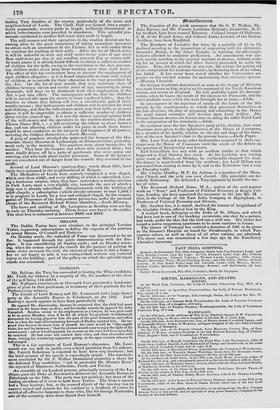SCOTLAND.
Mr. Balfour, the Tory, has succeeded in beating the Whig candidate, Mr. Trail!, for Orkney, by a majority of 30; the numbers at the close of the poll being 114 and 84. Mr. Wallace's constituents at Greenock have presented a handsome piece of plate to that gentleman, in testimony of their gratitude for his Parliamentary services. The friends of Lord Ramsay and Mr. Learmonth had a large dinner party at the Assembly Rooms in Edinburgh, on the 11th. Lord itamsay's speech appears to have been particularly silly.
He opposed Mr. Abercromby, because he conceived that the child bad more interest in the house than an alien ; and for similar reasons he opposed Sir John Campbell. Besides, owing to his employment as a lawyer, he was quite unfit to be an active Member, even if he did all which his gratitude to Edinburgh demanded, for having played to him the part of the good Samaritan, and taken him in when the more discriminating borough of Dudley rejected him. Ile op- posed him because he knew that, if elected, his visits would be "like angels' visits, few and far between ;" that the electors would cease to enjoy the light of his countenance : and so it lcul happened, for so soon as the votes hall been reemded, he vanished. He had come and courted their votes, and then absconded with them, leaving his wondering supportets gazing at the open window whence he had escaped. This is a fair specimen of Lord Ramsay's eloquence. Mr. Lear- month was too dull to justify even a brief quotation front his address. Mr. Patrick Robertson is reported to have been very facetious; but the brief account of his speech is exceedingly stupid. The entertain- ment concluded by Sir F. Walker Drummond proposing a cheer for the defeated Tory candidates, " and in particular Mr. Horatio Ross," the rejected of Montrose, Forfarshire, Perth, and Paisley.
An assembly of six hundred persons, principally tenantry of the Lo- thians, gave the Duke of Buceleuch a dinner at the Assembly Rootns in Edinburgh on the 13th. The party was not political ; but most of the leading members of it seem to have been Tories. The Duke's speech had a Tory leaning ; but, as the avowed object of the meeting was to express regard and esteem for his conduct as a landlord, of caurse he avoided all offensive language to those who, like Sir George Warrender, one of the company, were more liberal than himself.
























 Previous page
Previous page